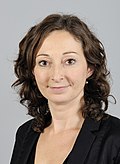 Distribution of Romanian citizens in Germany (2021) | |
| Total population | |
|---|---|
| 1,096,000 with Romanian ancestry (2022) [1] 883,670 Romanian citizens (2022) [2] | |
| Regions with significant populations | |
| Berlin · Munich · Frankfurt · Hamburg · Rhein-Ruhr · Nuremberg · Stuttgart · Bremen · Düsseldorf | |
| Languages | |
| Romanian • German Dialects
| |
| Religion | |
| Predominantly † Eastern Orthodox Christianity (Romanian Orthodox Church), also Atheist, Roman Catholic, Greek Catholic, Protestant |
| Part of a series of articles on |
| Romanians |
|---|
 |
Romanians in Germany are one of the sizable communities of the Romanian diaspora in Western Europe. According to German statistics, in 2022, the number of Romanian citizens in Germany was 883,670. [2] The number of people with Romanian ancestry in 2022 (defined as all persons who migrated to the present area of the Federal Republic of Germany after 1949, plus all foreign nationals born in Germany and all persons born in Germany as German nationals with at least one parent who migrated to Germany or was born in Germany as a foreign national) was 1,096,000. [1]























